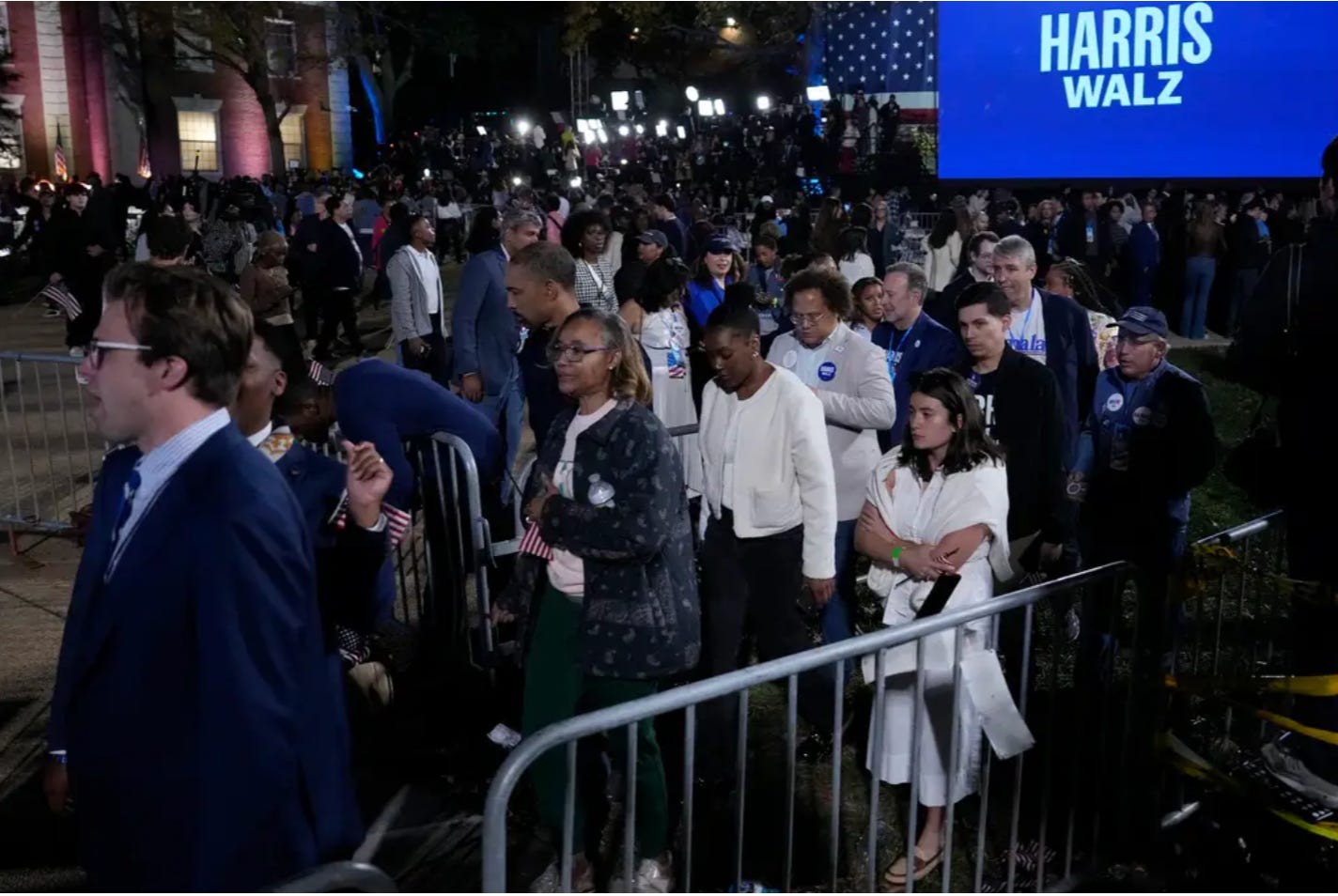In Defeat: Defiance
We're not going back. But no one is coming to save us. It's up to us.
“In War, Resolution;
In Defeat, Defiance;
In Victory, Magnanimity;
and in Peace, Good Will.”
- Winston Churchill, History of the Second World War
Shit went down last night. Especially, a bunch of illusions.
There will be plenty of competition in hyperbole to describe how bad of an outcome this election was. I don’t propose to add to it.
What I do propose is to remind yourself that the people you love and the people who love you, and the home we share, are worth fighting for. And that no one is coming to save them. That’s on us.
For the past year, this project has been about talking to climate people - entrepreneurs, journalists, engineers, activists, investors, lawyers, writers, researchers, political leaders - who seem to have very little in common. Prone to infighting and feelings of moral superiority and convinced that their way is best. Whether they are doomers, techno-optimists, alarmists. We will leave aside lukewarmers, cynics, and clout-chasing denialist/nihilists for now.
But this morning I am reminded that what they share is a sense that the struggle is worthwhile because it beats lying down without a fight. What may have changed this morning, if we’re lucky, is that we recognise we can no longer afford illusions or “that’s not my job” reflexes.
COP29 starts in less than a week. It will be shatteringly disappointing and may seem irrelevant - particularly as it’s now likely the US withdraws from the UNFCCC1 in January. Keep your eye on what Fatih Birol of the IEA says and does; what the small island states and others who know what the end of 1.5C means say and do; and the sectoral, non-state alliances that Simon Sharpe talks about in Five Times Faster and in my interview with him. They will be based in self-interest and probably more durable as a result.
There will be winners and losers. There always are. Solar and batteries are on runaway deployment in Texas, which just picked Donald Trump over Kamala Harris (who cast the tie-breaking vote for the Inflation Reduction Act) by 14 points. Worth noting there will be some interesting conversations between one prominent Texas climate tech tycoon and the next administration:
That’s why I spoke to climate tech folk working there in episodes with Modo’s Quentin "Q" Scrimshire and Octopus Energy’s Michael Lee. It may feel unsatisfying to find yourself rooting for free markets against monopolistic vested interests. Get used to it. And fight alongside the ones who are scaling the solutions that actually work right now, not promising fusion and space solar in 20 years.
CDR and SRM/geoengineering are going to skyrocket in the conversation. As Robert Höglund rightly observed on a webinar yesterday, CDR is likely to avoid US government hostility for the next few years. And with this result paired with the end of 1.5C and real worries about AMOC, solar radiation management debates are poised to come out of the shadows. We have episodes coming up trying to explore it in a rational way. More about that later this week.
For the same reasons, adaptation is going right to the top of the list. Climate Majority Project’s Rupert Read and author Manda Scott et al won’t be pleased about today but do have a timely book coming out on the topic:
And Ulrich Seitz’s project to explore what parts of it are investible with private capital, and players like Richard Youngman’s Cleantech Group helping map that out.
What adaptation, CDR and SRM have in common is a funding problem. What’s the IRR of a seawall? Who pays - and how much can you afford? For some of that, it will be interesting where US courts fall. Keep your eye on California Attorney General Rob Bonta, and the raft of climate litigation that is going to be a growth industry worldwide in the next few years. “Someone should pay for the damage” may sound crude but it’s a visceral, powerful sentiment that is only going to get stronger.
Expect activists to be even more suspicious of climate tech, and more radicalised. But keep an eye on people like Tadzio Mueller, who may be sceptics of “electrocapitalism” but see adaptation technologies that will protect more people as a moral imperative. (He’s also got a book out - and we’ll let you know when it’s going to be published in English.)
Turn to authors like Stephen Markley for imagining what the next few years may be like in The Deluge; observers like Peter Schwartzstein, Ernest Scheyder, and Akshat Rathi who have clear-eyed views of how the gears will keep grinding; and organisers like Hannah Scott of Oxfordshire Greentech, who make a compelling case for why markets like the UK should double down on climate tech as national strategy even more urgently.
I’ve seen people this morning likening this to waking up to the Brexit result. And to some even more shocking than 2016. Forgive me for getting personal for a moment but I think it’s more like losing your parents. Mine died relatively young and three presidents ago. In the past two years all but one of their generation of my family departed.
That awareness can be crushing, overwhelming: there are no grownups who are going to fix things; and there never were. There’s just us. We’re who’s left. We’re the front line. The decision is how you intend to spend the time we have.
Make it count.
Joe Lo’s piece highlights this may be tricky due to its ratification by the US Senate. Don’t hold your breath.





